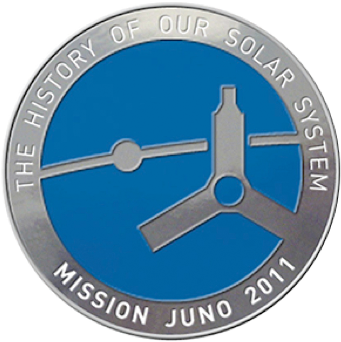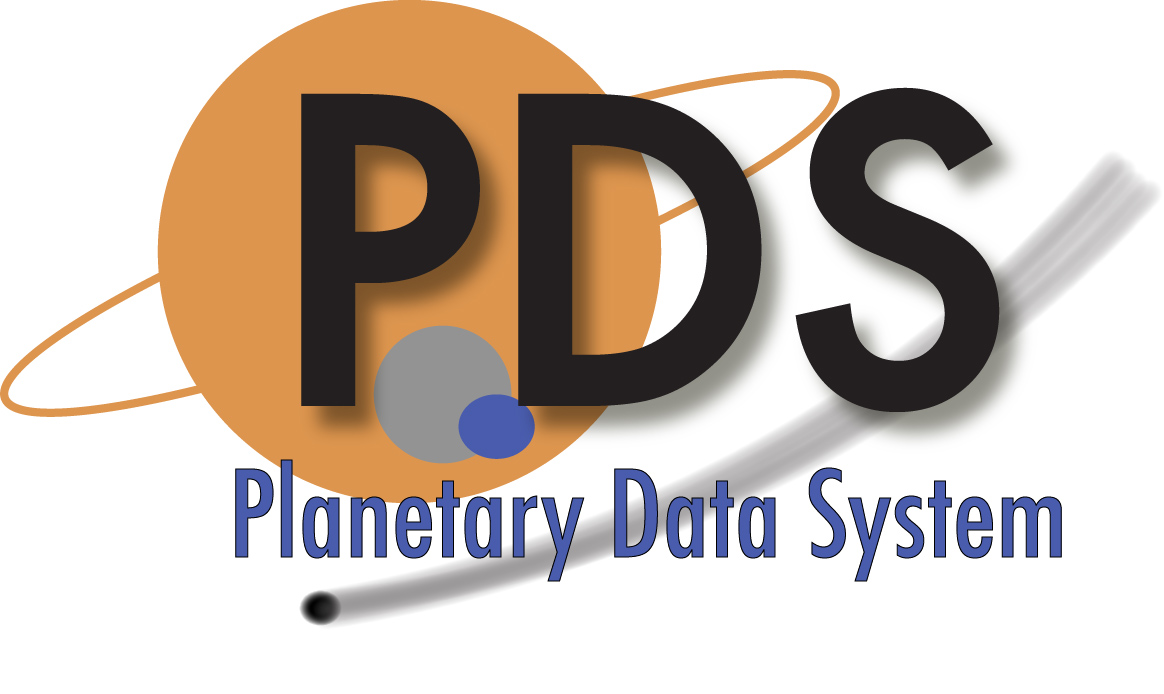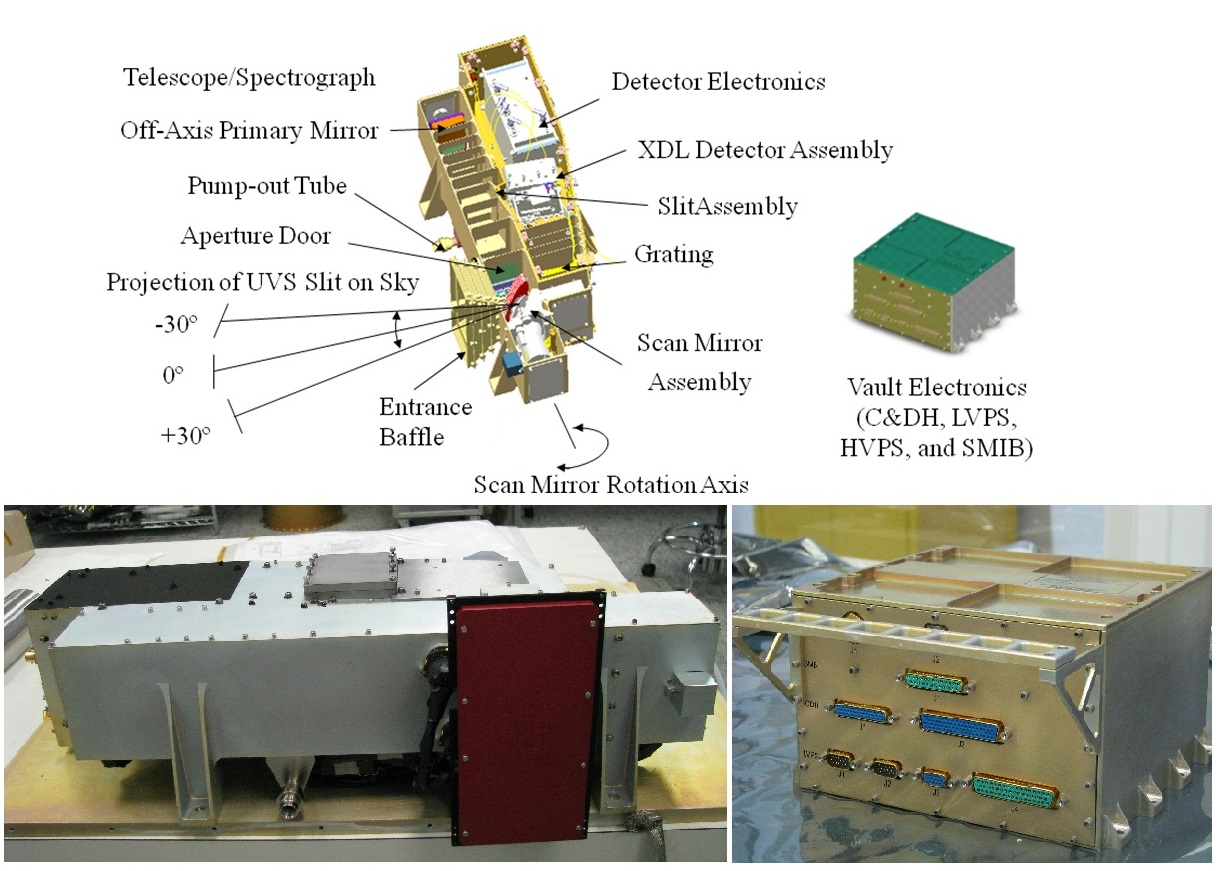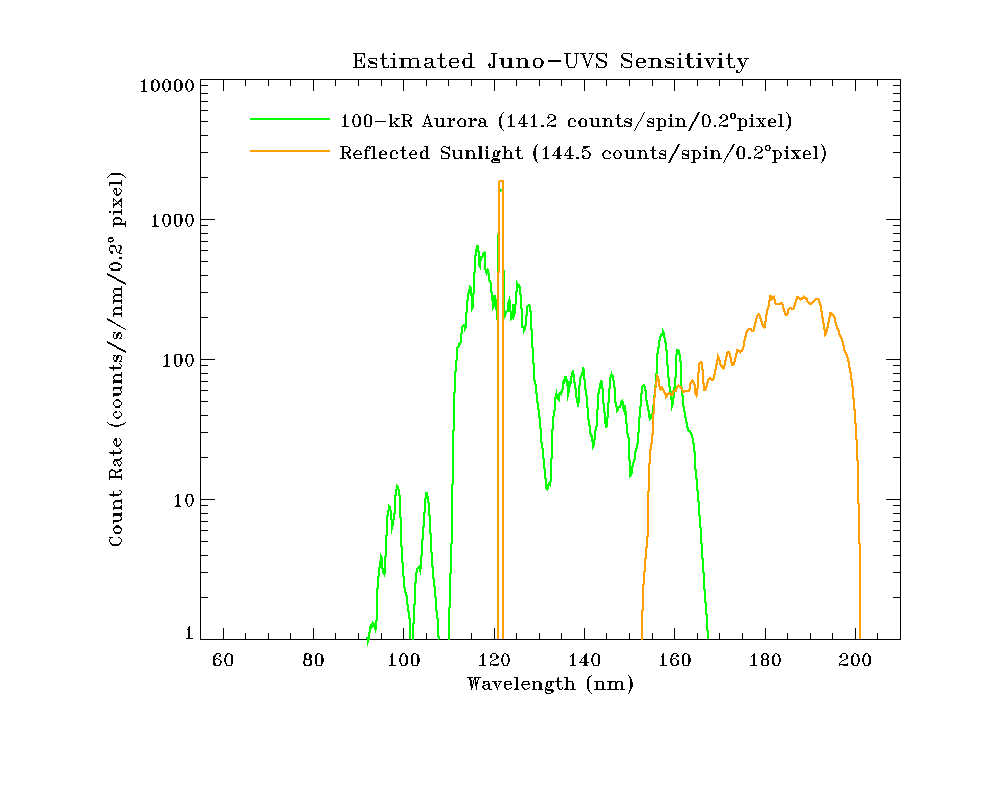- Calibrated Spectral Image: A 'quick-look' check on data quality. [Extension 0 = primary FITS header and data unit(HDU)]
- Acquisition List: [Extension 1]
- Calibrated Photon List [Extension 2] Contains events and related attributes
- Ancillary Data: [Extension 3] Contains additional data useful for mapping the observed emissions
- Calibrated Analog Count Rate [Extension 4]
- Calibrated Digital Count Rate: [Extension 5]
- Housekeeping Data: [Extension 6]
- Wavelength Lookup Image: [Extension 7]
- Mask Information: [Extension 8]

On this page
-
Introduction
Jupiter Data
Cruise and Earth Flyby Data and Approach Data
Citing data sets for publication
Bibliography
Spice
Instrument Description
UVS is an ultraviolet imaging spectrograph sensitive to both extreme and far-ultraviolet emissions in the 70-205 nm range that are used to characterize the morphology and spectral nature of Jupiter’s auroral emissions as they are targeted during the Juno mission. Similar instruments have flown on the Rosetta mission to comet 67 P/Churyumov-Gerasimenko, the New Horizons mission to Pluto and the Kuiper Belt; and the Lunar Reconnaissance Orbiter (LRO); and are planned for the JUICE and Europa Clipper future missions to the Jupiter system. See Gladstone, G.R. et al., (2017) The Ultraviolet Spectrograph on NASA’s Juno Mission, Space Sci Rev (2017) 213:447 – 473, DOI 10.1007/s11214-014-0040-z.
Measurement Objectives
Juno-UVS's main objective is to provide context for the particles and fields instruments (i.e., JADE, JEDI, Waves, and MAG). By observing expected locations of the Juno magnetic field line footprint, direct comparison of the precipitating particle fluxes measured by JADE and JEDI can be made with the FUV emissions they produce upon impacting Jupiter’s upper atmosphere (composed mainly of the Lyman series of H and the Lyman, Werner, and Rydberg band systems of H2).
Useful Mission Documents
Mission Description
Spacecraft Description
Mission Timeline (csv)
Instrument Description
Team Personnel
References
Spacecraft Description
Mission Timeline (csv)
Instrument Description
Team Personnel
References
The calibrated data files contain a collection of the far-ultraviolet photon detections of the Juno Ultraviolet Spectrograph (UVS). The fundamental derived parameters contained in a calibrated data file are a collection of the absolute time tags for each of the detected far-ultraviolet photons, the weight factor applied to each event to account for instrumental effects, the radiometric and wavelength calibrations and the geometric locations. The reduced data records are in FITS format and contain the calibrated photon list (Extension 2) and supporting and related data as follows
Need a fits reader
Calibrated Data - Directory containing the RDR data files
Selecting Data
A basic data unit for this migrated data consists of a FITS file that contains reduced data and supporting files and the corresponding PDS3 and PDS4 labels. Utilizing the appropriate Mission Timeline and Geometry Files will allow you to enter start and stop times or corresponding URNs to retrieve the desired data.
The geometry files generally span a period of +/- 5 hours of perijove and list various physical parameters at 10-minute intervals. The parameters include, e.g., the apparent angular size of Jupiter, planetocentric and planetographic sub-spacecraft and sub-solar longitudes and latitudes, spacecraft radial distance from Jupiter, observer distance and phase angle.
Geometry files for each perijove passage
Perijove table for Primary and Extended Missions
The tables of physical parameters for perijove and north and south pole passage can be used to isolate particular perijove passages, while geometry files for a selected passage can be used to isolate time intervals that correspond to desired data.
Physical Parameters for Juno's Orbits
Main Index (csv) This file summarizes the contents of the calibrated data archive. It lists URN, start and stop times and the file size. Times of perijove are tagged.
Geometry files - Each table contains geometry data for a time interval of +/-5 hours of perijove in 10 minute intervals. These were generated using WebGeocalc
Selecting data at the file level
Raw Data - Directory containing the EDR data files
Selecting Data - Use Index to determine start and stop times or to generate a list of URNs
Need a fits reader
Calibrated Data - Directory containing the RDR data files
Data Set Description (pdf)
Software Interface Specification Document (SIS) Instrument and data structures description
Documents - Directory containing the Document Collection.
Data Files
Software Interface Specification Document (SIS) Instrument and data structures description
Documents - Directory containing the Document Collection.
Data Files
A basic data unit for this migrated data consists of a FITS file that contains reduced data and supporting files and the corresponding PDS3 and PDS4 labels. Utilizing the appropriate Mission Timeline and Geometry Files will allow you to enter start and stop times or corresponding URNs to retrieve the desired data.
The geometry files generally span a period of +/- 5 hours of perijove and list various physical parameters at 10-minute intervals. The parameters include, e.g., the apparent angular size of Jupiter, planetocentric and planetographic sub-spacecraft and sub-solar longitudes and latitudes, spacecraft radial distance from Jupiter, observer distance and phase angle.
Geometry files for each perijove passage
Perijove table for Primary and Extended Missions
The tables of physical parameters for perijove and north and south pole passage can be used to isolate particular perijove passages, while geometry files for a selected passage can be used to isolate time intervals that correspond to desired data.
Physical Parameters for Juno's Orbits
Geometry files - Each table contains geometry data for a time interval of +/-5 hours of perijove in 10 minute intervals. These were generated using WebGeocalc
Selecting data at the file level
Raw Data - Directory containing the EDR data files
Software Interface Specification Document (SIS) - Instrument and data structures description
Data Set Description
Documents - Directory containing the Document Collection.
Data Files
Index (csv)
Data Set Description
Documents - Directory containing the Document Collection.
Data Files
Index (csv)
Selecting Data - Use Index to determine start and stop times or to generate a list of URNs
Calibrated Data - Directory containing the RDR data files
Selecting Data - Use Index to determine start and stop times or to generate a list of URNs
Raw Data - Directory containing the EDR data files
Selecting Data - Use Index to determine start and stop times or to generate a list of URNs
Software Interface Specification Document (SIS) - Instrument and data structures description
Data Set Description (pdf)
Documents - Directory containing the Document Collection.
Data Files
Index (csv)
Data Set Description (pdf)
Documents - Directory containing the Document Collection.
Data Files
Index (csv)
Selecting Data - Use Index to determine start and stop times or to generate a list of URNs
Raw Data - Directory containing the EDR data files
Software Interface Specification Document (SIS) - Instrument and data structures description
Data Set Description
Documents - Directory containing the Document Collection.
Data Files
Index (csv)
Data Set Description
Documents - Directory containing the Document Collection.
Data Files
Index (csv)
Selecting Data - Use Index to determine start and stop times or to generate a list of URNs
PDS recommendations for citing data sets can be found here.
Trantham B., (2014), Juno Jupiter UVS Calibrated Data Archive V1.0, PDS Atmospheres (ATM) Node, https://doi.org/10.17189/c32j-7r56
Trantham B., (2014), Juno Jupiter UVS Raw Data Archive V1.0, PDS Atmospheres (ATM) Node, https://doi.org/10.17189/b29k-pv96
Trantham B., L. Huber, (2017), Juno UVS Bundle, PDS Atmospheres (ATM) Node, https://doi.org/10.17189/1518951
Trantham B., (2014), Juno Jupiter UVS Calibrated Data Archive V1.0, PDS Atmospheres (ATM) Node, https://doi.org/10.17189/c32j-7r56
Trantham B., (2014), Juno Jupiter UVS Raw Data Archive V1.0, PDS Atmospheres (ATM) Node, https://doi.org/10.17189/b29k-pv96
Trantham B., L. Huber, (2017), Juno UVS Bundle, PDS Atmospheres (ATM) Node, https://doi.org/10.17189/1518951
Bibliography - A listing of team members to facilitate literature searches
 PDS: The Planetary Atmospheres Node
PDS: The Planetary Atmospheres Node



